Luminous Read online
Page 2
With good enough technology, though, those proteins didn’t have to bear the slightest relationship to the RNA inside.
The girl seemed to be impressed; her face lit up with anticipation. We negotiated a price. Too low by far; she should have been suspicious.
I looked her in the eye before handing over the sachet.
I said, ‘What do you need this shit for? The world is the world. You have to take it as it is. Accept it as it is: savage and terrible. Be strong. Never lie to yourself. That’s the only way to survive.’
She smirked at my apparent hypocrisy, but she was too pleased with her luck to turn nasty. ‘I hear what you’re saying. It’s a bad planet out there.’ She forced the money into my hand, adding, with wide-eyed mock sincerity, ‘And this is the last time I do Mother, I promise.’
I gave her the lethal virus, and watched her walk away across the grass and vanish into the shadows.
* * *
The Colombian air-force pilot who flew me down from Bogotá didn’t seem thrilled to be risking his life for a DEA bureaucrat. It was seven hundred kilometres to the border, and five different guerilla organisations held territory along the way: not a lot of towns, but several hundred possible sites for rocket launchers.
‘My great-grandfather,’ he said sourly, ‘died in fucking Korea fighting for General Douglas fucking MacArthur.’ I wasn’t sure if that was meant to be a declaration of pride or an intimation of an outstanding debt. Both, probably.
The helicopter was eerily silent, fitted out with phased sound absorbers, which looked like giant loudspeakers but swallowed most of the noise of the blades. The carbon-fibre fuselage was coated with an expensive network of chameleon polymers – although it might have been just as effective to paint the whole thing sky blue. An endothermic chemical mixture accumulated waste heat from the motor, and then discharged it through a parabolic radiator as a tightly focused skywards burst, every hour or so. The guerillas had no access to satellite images, and no radar they dared use; I decided that we had less chance of dying than the average Bogotá commuter. Back in the capital, buses had been exploding without warning, two or three times a week.
Colombia was tearing itself apart; La Violencia of the 1950s, all over again. Although all of the spectacular terrorist sabotage was being carried out by organised guerilla groups, most of the deaths so far had been caused by factions within the two mainstream political parties butchering each other’s supporters, avenging a litany of past atrocities which stretched back for generations. The group who’d actually started the current wave of bloodshed had negligible support; Ejército de Simon Bolívar were lunatic right-wing extremists who wanted to ‘reunite’ with Panama, Venezuela, and Ecuador – after two centuries of separation – and drag in Peru and Bolivia, to realise Bolívar’s dream of Gran Colombia. By assassinating President Marín, though, they’d triggered a cascade of events that had nothing to do with their ludicrous cause. Strikes and protests, street battles, curfews, martial law. The repatriation of foreign capital by nervous investors, followed by hyperinflation, and the collapse of the local financial system. Then a spiral of opportunistic violence. Everyone, from the paramilitary death squads to the Maoist splinter groups, seemed to believe that their hour had finally come.
I hadn’t seen so much as a bullet fired, but from the moment I’d entered the country there’d been acid churning in my guts, and a heady, ceaseless adrenaline rush coursing through my veins. I felt wired, feverish … alive. Hypersensitive as a pregnant woman: I could smell blood, everywhere. When the hidden struggle for power which rules all human affairs finally breaks through to the surface, finally ruptures the skin, it’s like witnessing some giant primordial creature rise up out of the ocean. Mesmerising, and appalling. Nauseating – and exhilarating.
Coming face to face with the truth is always exhilarating.
* * *
From the air, there was no obvious sign that we’d arrived; for the last two hundred kilometres, we’d been passing over rain forest – cleared in patches for plantations and mines, ranches and timber mills, shot through with rivers like metallic threads, but most of it resembling nothing so much as an endless expanse of broccoli. El Nido permitted natural vegetation to flourish all around it – and then imitated it … which made sampling at the edges an inefficient way to gather the true genetic stock for analysis. Deep penetration was difficult, though, even with purpose-built robots – dozens of which had been lost – so edge samples had to suffice, at least until a few more members of Congress could be photographed committing statutory rape and persuaded to vote for better funding. Most of the engineered plant tissues self-destructed in the absence of regular chemical and viral messages drifting out from the core, reassuring them that they were still in situ – so the main DEA research facility was on the outskirts of El Nido itself, a collection of pressurised buildings and experimental plots in a clearing blasted out of the jungle on the Colombian side of the border. The electrified fences weren’t topped with razor wire; they turned ninety degrees into an electrified roof, completing a chain-link cage. The heliport was in the centre of the compound, where a cage within the cage could, temporarily, open itself to the sky.
Madeleine Smith, the research director, showed me around. In the open, we both wore hermetic biohazard suits – although if the modifications I’d received in Washington were working as promised, mine was redundant. El Nido’s short-lived defensive viruses occasionally percolated out this far; they were never fatal, but they could be severely disabling to anyone who hadn’t been inoculated. The forest’s designers had walked a fine line between biological ‘self-defence’ and unambiguously military applications. Guerillas had always hidden in the engineered jungle – and raised funds by collaborating in the export of Mother – but El Nido’s technology had never been explicitly directed towards the creation of lethal pathogens.
So far.
‘Here, we’re raising seedlings of what we hope will be a stable El Nido phenotype, something we call beta seventeen.’ They were unremarkable bushes with deep-green foliage and dark-red berries; Smith pointed to an array of camera-like instruments beside them. ‘Real-time infra-red micro-spectroscopy. It can resolve a medium-sized RNA transcript, if there’s a sharp surge in production in a sufficient number of cells, simultaneously. We match up the data from these with our gas chromatography records, which show the range of molecules drifting out from the core. If we can catch these plants in the act of sensing a cue from El Nido – and if their response involves switching on a gene and synthesising a protein – we may be able to elucidate the mechanism, and eventually short-circuit it.’
‘You can’t just … sequence all the DNA, and work it out from first principles?’ I was meant to be passing as a newly appointed administrator, dropping in at short notice to check for gold-plated paper clips, but it was hard to decide exactly how naı¨ve to sound.
Smith smiled politely. ‘El Nido DNA is guarded by enzymes which tear it apart at the slightest hint of cellular disruption. Right now, we’d have about as much of a chance of sequencing it as I’d have of … reading your mind by autopsy. And we still don’t know how those enzymes work; we have a lot of catching up to do. When the drug cartels started investing in biotechnology, forty years ago, copy protection was their first priority. And they lured the best people away from legitimate labs around the world – not just by paying more, but by offering more creative freedom, and more challenging goals. El Nido probably contains as many patentable inventions as the entire agrotechnology industry produced in the same period. And all of them a lot more exciting.’
Was that what had brought Largo here? More challenging goals? But El Nido was complete, the challenge was over; any further work was mere refinement. And at fifty-five, surely he knew that his most creative years were long gone.
I said, ‘I imagine the cartels got more than they bargained for; the technology transformed their business beyond recognition. All the old addictive substances became too easy
to synthesise biologically – too cheap, too pure, and too readily available to be profitable. And addiction itself became bad business. The only thing that really sells now is novelty.’
Smith motioned with bulky arms towards the towering forest outside the cage – turning to face south-east, although it all looked the same. ‘El Nido was more than they bargained for. All they really wanted was coca plants that did better at lower altitudes, and some gene-tailored vegetation to make it easier to camouflage their labs and plantations. They ended up with a small de facto nation full of gene hackers, anarchists, and refugees. The cartels are only in control of certain regions; half the original geneticists have split off and founded their own little jungle utopias. There are at least a dozen people who know how to program the plants – how to switch on new patterns of gene expression, how to tap into the communications networks – and with that, you can stake out your own territory.’
‘Like having some secret, shamanistic power to command the spirits of the forest?’
‘Exactly. Except for the fact that it actually works.’
I laughed. ‘Do you know what cheers me up the most? Whatever else happens, the real Amazon, the real jungle, will swallow them all in the end. It’s lasted – what? Two million years? Their own little utopias! In fifty years’ time, or a hundred, it will be as if El Nido had never existed.’
Less than chaff in a breeze.
Smith didn’t reply. In the silence, I could hear the monotonous click of beetles, from all directions. Bogotá, high on a plateau, had been almost chilly. Here, it was as sweltering as Washington itself.
I glanced at Smith. She said, ‘You’re right, of course.’ But she didn’t sound convinced at all.
* * *
In the morning, over breakfast, I reassured Smith that I’d found everything to be in order. She smiled warily. I think she suspected that I wasn’t what I claimed to be, but that didn’t really matter. I’d listened carefully to the gossip of the scientists, technicians and soldiers; the name Guillermo Largo hadn’t been mentioned once. If they didn’t even know about Largo, they could hardly have guessed my real purpose.
It was just after nine when I departed. On the ground, sheets of light, delicate as auroral displays, sliced through the trees around the compound. When we emerged above the canopy, it was like stepping from a mist-shrouded dawn into the brilliance of noon.
The pilot, begrudgingly, took a detour over the centre of El Nido. ‘We’re in Peruvian air space, now,’ he boasted. ‘You want to spark a diplomatic incident?’ He seeemed to find the possibility attractive.
‘No. But fly lower.’
‘There’s nothing to see. You can’t even see the river.’
‘Lower.’ The broccoli grew larger, then suddenly snapped into focus; all that undifferentiated green turned into individual branches, solid and specific. It was curiously shocking, like looking at some dull familiar object through a microscope and seeing its strange particularity revealed.
I reached over and broke the pilot’s neck. He hissed through his teeth, surprised. A shudder passed through me, a mixture of fear and a twinge of remorse. The autopilot kicked in and kept us hovering; it took me two minutes to unstrap the man’s body, drag him into the cargo hold, and take his seat.
I unscrewed the instrument panel and patched in a new chip. The digital log being beamed via satellite to an air-force base to the north would show that we’d descended rapidly, out of control.
The truth wasn’t much different. At a hundred metres, I hit a branch and snapped a blade on the front rotor; the computers compensated valiantly, modelling and remodelling the situation, trimming the active surfaces of the surviving blades – and no doubt doing fine for each five-second interval between bone-shaking impacts and further damage. The sound absorbers went berserk, slipping in and out of phase with the motors, blasting the jungle with pulses of intensified noise.
Fifty metres up, I went into a slow spin, weirdly smooth, showing me the thickening canopy as if in a leisurely cinematic pan. At twenty metres, free fall. Air bags inflated around me, blocking off the view. I closed my eyes, redundantly, and gritted my teeth. Fragments of prayers spun in my head – the detritus of childhood, afterimages burned into my brain, meaningless but unerasable. I thought: If I die, the jungle will claim me. I am flesh, I am chaff. Nothing will remain to be judged. By the time I recalled that this wasn’t true jungle at all, I was no longer falling.
The air bags promptly deflated. I opened my eyes. There was water all around, flooded forest. A panel of the roof between the rotors blew off gently with a hiss like the dying pilot’s last breath, and then drifted down like a slowly crashing kite, turning muddy silver, green, and brown as it snatched at the colours around it.
The life raft had oars, provisions, flares – and a radio beacon. I cut the beacon loose and left it in the wreckage. I moved the pilot back into his seat, just as the water started flooding in to bury him.
Then I set off down the river.
* * *
El Nido had divided a once-navigable stretch of the Rio Putumayo into a bewildering maze. Sluggish channels of brown water snaked between freshly raised islands of soil, covered in palms and rubber plants, and the inundated banks where the oldest trees – chocolate-coloured hardwood species (predating the geneticists, but not necessarily unmodified) – soared above the undergrowth and out of sight.
The lymph nodes in my neck and groin pulsed with heat, savage but reassuring; my modified immune system was dealing with El Nido’s viral onslaught by generating thousands of new killer T-cell clones en masse, rather than waiting for a cautious antigen-mediated response. A few weeks in this state, and the chances were that a self-directed clone would slip through the elimination process and burn me up with a novel autoimmune disease – but I didn’t plan on staying that long.
Fish disturbed the murky water, rising up to snatch surface-dwelling insects or floating seed pods. In the distance, the thick coils of an anaconda slid from an overhanging branch and slipped languidly into the water. Between the rubber plants, hummingbirds hovered in the maws of violet orchids. So far as I knew, none of these creatures had been tampered with; they had gone on inhabiting the prosthetic forest as if nothing had changed.
I took a stick of chewing gum from my pocket, rich in cyclamates, and slowly roused one of my own sets of White Knights. The stink of heat and decaying vegetation seemed to fade, as certain olfactory pathways in my brain were numbed, and others sensitised – a kind of inner filter coming into play, enabling any signal from the newly acquired receptors in my nasal membranes to rise above all the other, distracting odours of the jungle.
Suddenly, I could smell the dead pilot on my hands and clothes – the lingering taint of his sweat and faeces – and the pheromones of spider monkeys in the branches around me, pungent and distinctive as urine. As a rehearsal, I followed the trail for fifteen minutes, paddling the raft in the direction of the freshest scent, until I was finally rewarded with chirps of alarm and a glimpse of two skinny grey-brown shapes vanishing into the foliage ahead.
My own scent was camouflaged; symbionts in my sweat glands were digesting all the characteristic molecules. There were long-term side-effects from the bacteria, though, and the most recent intelligence suggested that El Nido’s inhabitants didn’t bother with them. There was a chance, of course, that Largo had been paranoid enough to bring his own.
I stared after the retreating monkeys, and wondered when I’d catch my first whiff of another living human. Even an illiterate peasant who’d fled the violence to the north would have valuable knowledge of the state of play between the factions in here, and some kind of crude mental map of the landscape.
The raft began to whistle gently, air escaping from one sealed compartment. I rolled into the water and submerged completely. A metre down, I couldn’t see my own hands. I waited and listened, but all I could hear was the soft plop of fish breaking the surface. No rock could have holed the plastic of the raft; it
had to have been a bullet.
I floated in the cool milky silence. The water would conceal my body heat, and I’d have no need to exhale for ten minutes. The question was whether to risk raising a wake by swimming away from the raft, or to wait it out.
Something brushed my cheek, sharp and thin. I ignored it. It happened again. It didn’t feel like a fish, or anything living. A third time, and I seized the object as it fluttered past. It was a piece of plastic a few centimetres wide. I felt around the rim; the edge was sharp in places, soft and yielding in others. Then the fragment broke in two in my hand.
I swam a few metres away, then surfaced cautiously. The life raft was decaying, the plastic peeling away into the water like skin in acid. The polymer was meant to be cross-linked beyond any chance of biodegradation, but obviously some strain of El Nido bacteria had found a way.
I floated on my back, breathing deeply to purge myself of carbon dioxide, contemplating the prospect of completing the mission on foot. The canopy above seemed to waver, as if in a heat haze, which made no sense. My limbs grew curiously warm and heavy. It occurred to me to wonder exactly what I might be smelling if I hadn’t shut down ninety per cent of my olfactory range. I thought: If I’d bred bacteria able to digest a substance foreign to El Nido, what else would I want them to do when they chanced upon such a meal? Incapacitate whoever had brought it in? Broadcast news of the event with a biochemical signal?
I could smell the sharp odours of half a dozen sweat-drenched people when they arrived, but all I could do was lie in the water and let them fish me out.
* * *
After we left the river, I was carried on a stretcher, blindfolded and bound. No one talked within earshot. I might have judged the pace we set by the rhythm of my bearers’ footsteps, or guessed the direction in which we travelled by hints of sunlight on the side of my face … but in the waking dream induced by the bacterial toxins, the harder I struggled to interpret those cues, the more lost and confused I became.

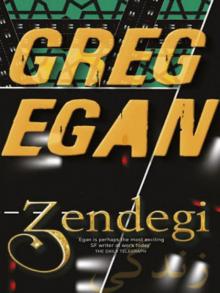 Zendegi
Zendegi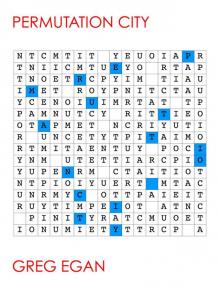 Permutation City
Permutation City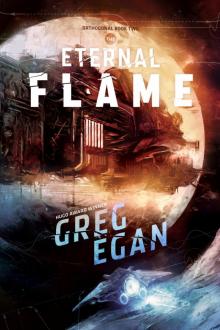 The Eternal Flame
The Eternal Flame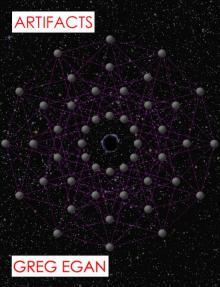 Artifacts
Artifacts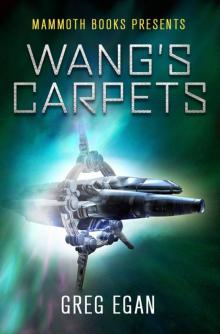 Wang's Carpets
Wang's Carpets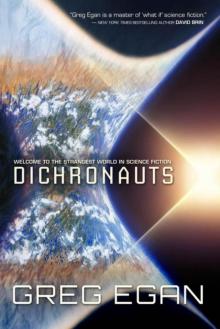 Dichronauts
Dichronauts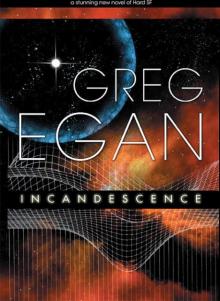 Incandescence
Incandescence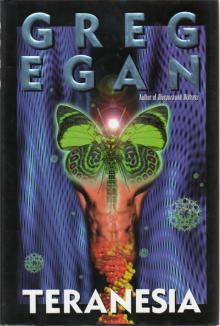 Teranesia
Teranesia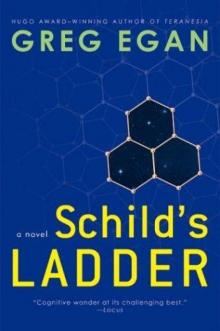 Schild's Ladder
Schild's Ladder Quarantine
Quarantine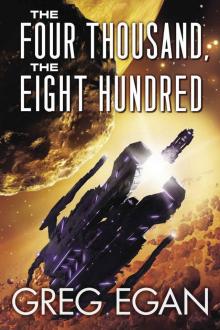 The Four Thousand, the Eight Hundred
The Four Thousand, the Eight Hundred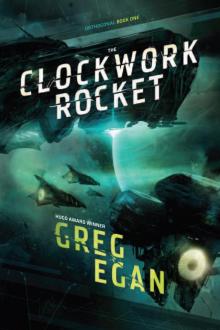 The Clockwork Rocket
The Clockwork Rocket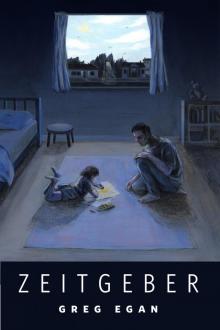 Zeitgeber
Zeitgeber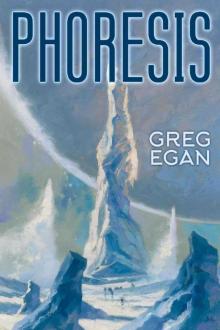 Phoresis
Phoresis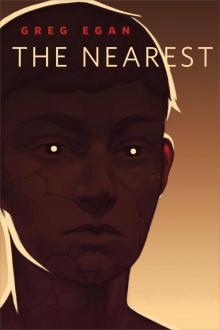 The Nearest
The Nearest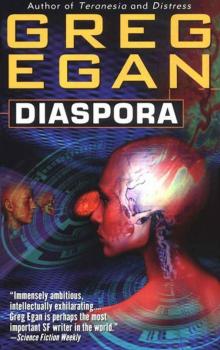 Diaspora
Diaspora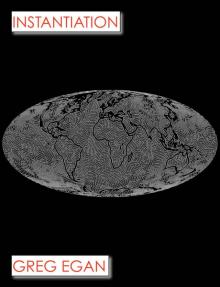 Instantiation
Instantiation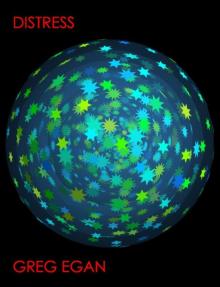 Distress
Distress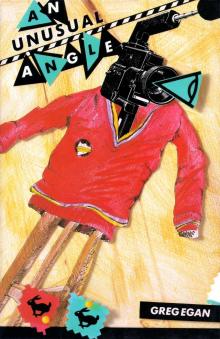 An Unusual Angle
An Unusual Angle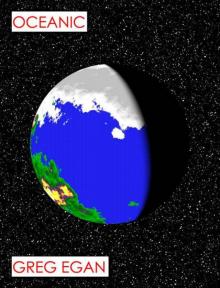 Oceanic
Oceanic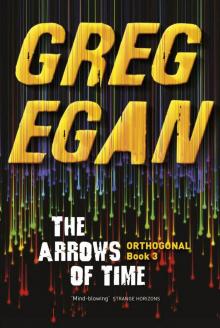 The Arrows of Time
The Arrows of Time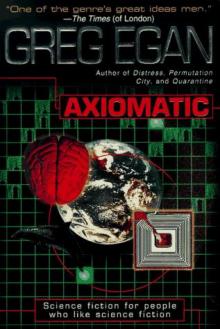 Axiomatic
Axiomatic![Anthology 2. Luminous [1998, 2010] Read online](http://i1.bookreadfree.com/i/03/18/anthology_2_luminous_1998_2010_preview.jpg) Anthology 2. Luminous [1998, 2010]
Anthology 2. Luminous [1998, 2010]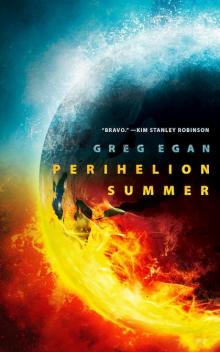 Perihelion Summer
Perihelion Summer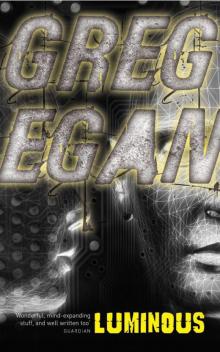 Luminous
Luminous